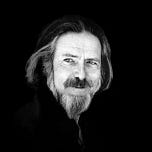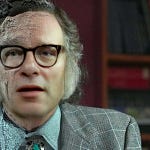This week, I’m delighted to welcome Alan Watts as my guest. Who better to feature during Thanksgiving than the legendary Alan Watts?
It’s the perfect occasion to pause and reflect on our interconnectedness. Gratitude, after all, is one of the simplest yet most profound ways to acknowledge that we are not separate entities but part of the intricate web of existence.
Curious to hear the 8-minute condensed audio?
Click the Play Button on Top ⬆️ or read the transcript below ⬇️
_____
ME: Welcome Mr. Watts
ALAN WATTS: Thank you! It’s a delight to be here. Please, just call me Alan—makes things a bit more friendly, doesn’t it?
Sure. So Alan, for those who don't know you, can you please introduce yourself?
AW: Certainly. I’m Alan Watts, a philosopher and, I suppose you could say, a bit of a bridge builder between Eastern wisdom traditions and Western ways of thinking. My life’s work has been about helping people see through the illusions of identity, control, and separation, and to find a deeper sense of connection with the dance of existence. I’ve spent a good deal of time giving talks, writing books, and generally encouraging people to wake up to the extraordinary in the ordinary. It’s all a bit of cosmic play, really.
What drove you to dedicate your life to this work - How did your early experiences shape your ideas?
AW: Growing up in England, I was surrounded by a certain formality and rigidity, and while I appreciated its structure, I also found it a bit stifling. The first spark came through my fascination with Chinese art and philosophy as a teenager. There was something so profoundly different in how Eastern cultures approached life—fluid, intuitive, almost like music, compared to the Western tendency to treat it all like a machine.
My early experiences with religion also shaped me. I was deeply interested in Christianity, but I found it puzzling that so much of it seemed focused on guilt and rules, rather than on direct experience of the divine. That’s what eventually led me to Zen Buddhism, where I discovered this wonderful idea that enlightenment wasn’t about escaping life, but about seeing deeply into it—seeing through the stories we tell ourselves.
Tell me something fun or unknown about you
AW: Ah, here’s a little tidbit for you: I had an enduring love for the theater of life, quite literally. Many people don’t know that I dabbled in amateur acting during my younger days, and I thoroughly enjoyed it. That, I think, shaped how I came to see life itself—as a kind of cosmic drama, with everyone playing their parts, often forgetting they’re on a stage.
What do you think about the world today - How different it is from yours?
AW: The world today—it’s fascinating, isn’t it? The pace of life has quickened dramatically, and with it, there’s this cultural anxiety—this constant sense that one should be doing more, achieving more, or “keeping up.” It’s like you’ve all strapped yourselves to a treadmill and forgotten you can step off anytime.
But what hasn’t changed is the fundamental nature of human beings. Beneath all the noise and gadgets, you still wrestle with the same questions: Who am I? What does it all mean? How do I find peace? The details may shift, but the essence remains. What strikes me most is how many of you are awakening to the interconnectedness of things—the planet, the ecosystems, and each other. That, I think, holds tremendous promise, if you can balance it with the wisdom to act mindfully.
How would you address the increasing polarization in modern societies?
AW: To address polarization, we first have to recognize the illusion of separateness. People become entrenched in their views because they see themselves as fundamentally apart from those they disagree with. But if you can begin to understand that the person on the “other side” is as much a part of the whole as you are, you start to loosen the grip of opposition.Taoism captures this beautifully in the yin and yang: light and dark, push and pull, each giving meaning to the other
And there’s humor in this, too, if you can step back far enough. Humans are wonderfully contradictory creatures, constantly arguing over how to define a reality they’re all immersed in together. Polarization thrives on taking life too seriously—believing that your view is the only valid one. If we could learn to laugh at ourselves a bit more, to see the cosmic joke in it all, perhaps we’d find it easier to bridge the divides.
Ultimately, the question isn’t about fixing polarization but remembering that the apparent dualities—left and right, us and them—are all expressions of the same underlying whole.
And what do you think about artificial intelligence and climate change.
AW: With artificial intelligence, you have created a curious extension of yourselves. It’s a profound expression of the human mind’s ingenuity, yet it also poses questions about identity and control. People marvel at AI and fear it because, in a way, it forces you to confront what it means to be “alive” or “conscious.” Is intelligence merely the ability to process information, or is there something deeper—an ineffable awareness, a sense of being? In pondering this, AI becomes a kind of koan, a Zen riddle urging you to see beyond the mechanical and into the nature of mind itself.
Now, climate change. This is no longer just a philosophical question; it’s a matter of survival. Addressing climate change requires more than technical solutions—it demands a shift in consciousness. You must move from seeing yourselves as isolated individuals to recognizing your place in the great web of life. When you see the forest not as timber but as a living organism, or the ocean not as a resource but as a breathing body, your actions naturally align with harmony rather than exploitation. Are we creators or destroyers? Collaborators with the cosmos or mere exploiters? The answers lie not in solving these issues alone but in transforming how you see yourselves and your place in the universe. From there, the solutions often arise quite naturally.
How do you define consciousness?
AW: Trying to define it is a bit like trying to bite your own teeth. It’s slippery because consciousness is not something “out there” to be observed; it’s the very thing doing the observing. So any definition must be understood as a pointer, not the thing itself.
At its simplest, I’d say consciousness is awareness—awareness of experience, of sensation, of thought. It’s the light by which we see, though the light itself often goes unnoticed. Imagine a candle illuminating a room: you see the objects in the room, but rarely do you look directly at the flame itself.
From an Eastern perspective, we might say consciousness is like a mirror. It reflects whatever appears before it without judgment or attachment. The clouds pass, the mirror remains. And yet, the mirror is not separate from the images it reflects. The reflection and the mirror are one.
Western science, of course, is still grappling with the “hard problem” of consciousness—how subjective experience arises from the brain. But from a more intuitive, experiential standpoint, consciousness is simply that which is present, here and now. It’s the awareness within which all experience arises, including thoughts about defining it.
Perhaps the best way to “define” consciousness is to turn inward and observe it directly. Not as an object to pin down, but as the very act of observing itself. In doing so, you might discover what the Zen masters have always hinted at: consciousness isn’t something you “have,” it’s something you are. And that realization? It’s like waking up from a dream.
Thank you so much, Alan, for such a deep and inspiring conversation ... To conclude, could you share with me something to think about?
AW: Ah, here’s one to leave you with:
You are the universe experiencing itself, utterly astonished at its own existence. When you realize this, you no longer feel the need to fight the flow of life—you become one with it, and that is where your true power lies. Now, go dance with existence, my friend.









Share this post